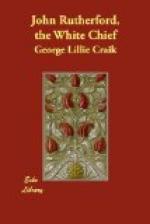“The jacket was of course taken from him; and as the only excuse he had to offer for his misconduct was that he had lost a shirt that had been given to him, and that he considered himself authorised to get remuneration in any way he could, he was dismissed without those presents which were given to the others. We were glad to see that his countrymen seemed to notice his conduct in the strongest terms of disapprobation; and the next day, when they were about to leave us, they seemed so determined to put him to death that they were requested not to do so, but to consider his having lost his presents, and his being forbidden ever to come near the ship, a sufficient punishment for his offence.”
It is very remarkable, that, whenever a child is born in New Zealand, it is the invariable practice to take it to the tohunga, or priest, who sprinkles it on the face with water, from a leaf which he holds in his hand. It is believed that the neglect of this ceremony would be attended with the most baneful consequences to the child.
Much reverence is felt among the New Zealanders for dreams; and it is believed that the favoured of heaven often receive in this way the communications of the gods. We need hardly remark how universal this superstition has been. The reader of Homer will recollect the
[Greek: kai gar t onar ek Dios estin]
of that poet, and the [Greek: oulos oneiros], or evil dream, which, in the second book of the Iliad, Jupiter sends down to Agamemnon, to lure him to give battle to the Trojans in the absence of Achilles.
We must refer to Lafitau’s learned work on the savages of America for an account of the notions which prevail among them as to divination by dreams. Dillon tells us that he found no way so effectual of repressing the importunities of his New Zealand friends, in any case in which it was inconvenient to gratify them, as assuring them he had dreamed that the favour they requested would turn out a misfortune to them. When some of them, for example, entreated that he would take them with him to India, he told them that he had dreamed that if they went to that country they would die there; and this at once put an end to their solicitations.
FOOTNOTES:
[Footnote BL: The Maoris and Hawaiians use the word “iwi” for a bone; the Samoans, Tahitians, and other islanders say “ivi.”]
[Footnote BM: Probably Tupa.]
[Footnote BN: Probably Kaipara.]
[Footnote BO: Tara.]
[Footnote BP: Okita.]
[Footnote BQ: Tupi.]
[Footnote BR: Rangihoua, in the Bay of Islands.]
[Footnote BS: Kawa-kawa, in the same district.]
[Footnote BT: Te Morenga, a chief of the Bay of Islands.]
[Footnote BU: The maketu, which is correctly described here, was one of the most firmly established institutions in New Zealand in old times.]




